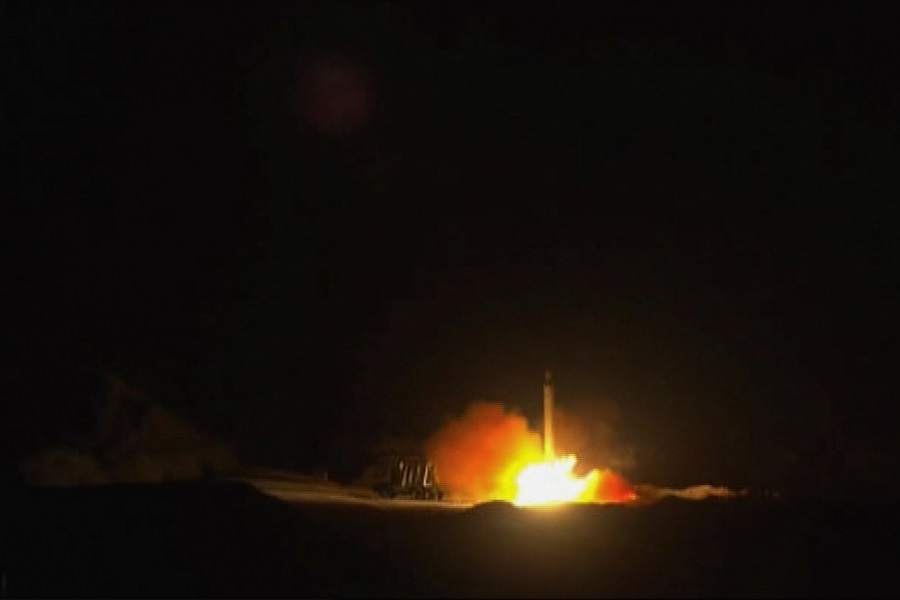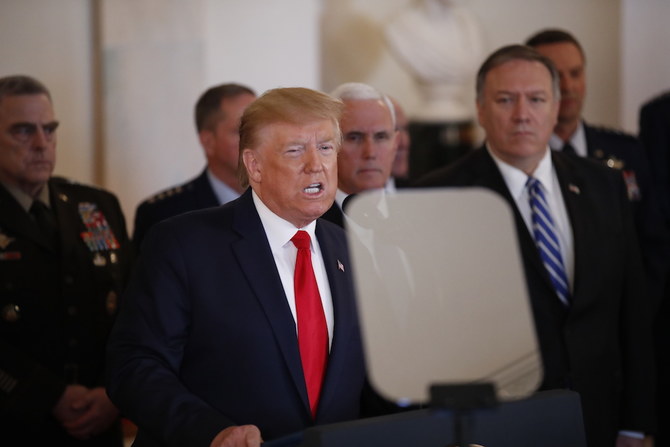WASHINGTON: President Donald Trump said Wednesday Iran appeared to be “standing down” after missile strikes on US troop bases in Iraq that resulted in no American or Iraqi deaths.
“All of our soldiers are safe and only minimal damage was sustained at our military bases. Our great American forces are prepared for anything,” he said in an address to the nation from the White House.
“Iran appears to be standing down, which is a good thing for all parties concerned and a very good thing for the world. No American or Iraqi lives were lost.”
"As long as I am President of the United States, Iran will never be allowed to have a nuclear weapon." pic.twitter.com/7lzGY5fWz3
— The White House (@WhiteHouse) January 8, 2020
Trump said the United States would immediately be imposing “additional punishing sanctions” on Iran but made no mention of military retaliation to the missile attacks — seen by experts as a measured first response by Iran to the killing of General Qassem Soleimani in an American drone strike in Baghdad.
Launched for the first time by forces inside Iran instead of a proxy, the missile attack marked a new turn in the intensifying confrontation between Washington and Tehran and sent world oil prices soaring.

An image grab from footage obtained from the state-run Iran Press news agency on January 8, 2020 allegedly shows rockets launched from the Islamic republic against the US military base in Ein-al Asad in Iraq. (File/AFP)
Trump touted economic achievements that he said had made the US less dependent on Middle Eastern oil, changing Washington’s “strategic priorities” in the region.
“Today I am going to ask NATO to become much more involved in the Middle East process,” he said.
He also called for world powers to follow his lead in withdrawing last May from the 2015 nuclear deal with Iran.
Prime Minister Boris Johnson underlined Britain’s continued commitment to the Iranian nuclear deal, Johnson’s spokesman said on Thursday.
“The prime minister spoke with President Rouhani of Iran this morning. They discussed the situation in the region following the death of Qassem Soleimani and the prime minister called for an end to hostilities,” the spokesman told reporters.
“The prime minister underlined the UK’s continued commitment to the JCPOA (Joint Comprehensive Plan of Action, or nuclear deal) and to ongoing dialogue to avoid nuclear proliferation and reduce tensions,” he said, adding that Britain’s position was that the JCPOA was the best arrangement available.
Charles Michel, President of the European Council, on Thursday also said that he has spoken to Iran’s President Hassan Rouhani, and has urged Tehran to come back into compliance with the nuclear deal.
The agreement is already unraveling, with Tehran announcing on Sunday that it would roll back the limit on the number of centrifuges used in uranium enrichment, one of its commitments under the agreement.
Just spoke with @HassanRouhani about recent developments. #JCPOA remains crucial for global security.
I called #Iran not to pose irreversible acts. #EU has its own interests and its vision & will enforce its role on an international level.
Readout: https://t.co/DoRw3azKZ3 pic.twitter.com/9Wv1qlZSzj
— Charles Michel (@eucopresident) January 9, 2020
“The time has come for the United Kingdom, Germany, France, Russia, and China to recognize this reality. They must now break away from the remnants of the Iran deal, or JCPOA,” Trump said.
“We must all work together toward making a deal with Iran that makes the world a safer and more peaceful place.”
He addressed Iranians directly, saying the US wanted them to enjoy the “great future” of prosperity and harmony with other nations that they deserve.
“The United States is ready to embrace peace with all who seek it,” he said.
World leaders have condemned the Iranian missile strikes, which targeted the sprawling Ain Al-Asad air base in western Iraq and a base in Irbil, both housing American and other foreign troops deployed as part of a US-led coalition fighting the remnants of the Daesh group.
Iran’s supreme leader called the attacks a “slap in the face” for the United States but said revenge was yet to come for the killing of Soleimani, the head of the Revolutionary Guards’ foreign operations arm.




























